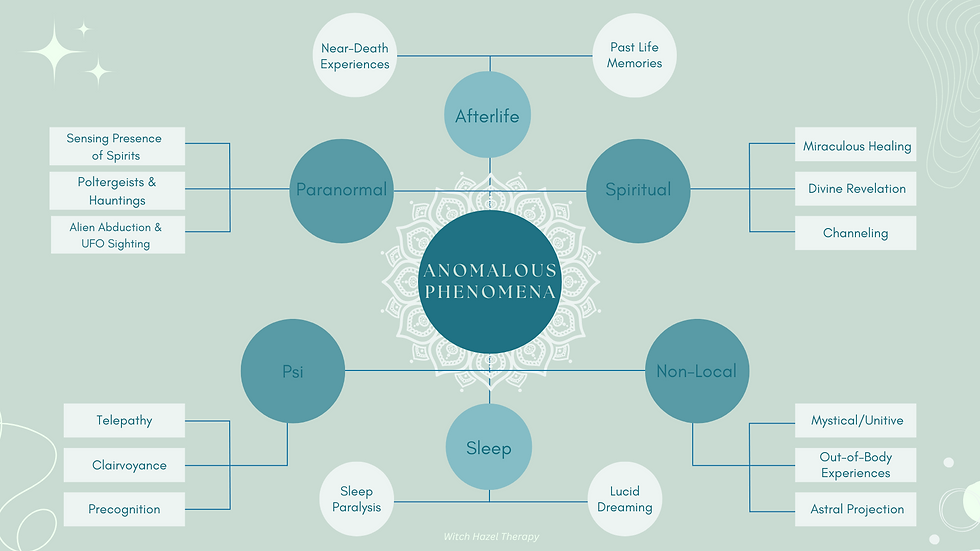Insights into Parapsychological Research: Anomalous Phenomena
- Lauren Crowley Taylor

- Jan 19, 2023
- 2 min read
Updated: Jan 24, 2023

What are anomalous experiences?
Experiences that depart from normative states of consciousness and/or consensus reality.
Experiences that remain unexplained by the Western scientific/medical model (or are believed to be at odds with it).
Cultures vary in their acceptance of these experiences. Some cultural narratives make space for anomalous phenomena, while others may deem them as delusional or pathological.
These experiences may be confusing, distressing, traumatic, awe-inspiring, transformative, ecstatic, and/or enriching.
For some, these experiences are wholly spontaneous and unexpected, shifting the experiencer’s conception of reality. Others seek out these experiences, fine-tuning their "sixth sense."
When an experiencer is unable to speak to others about what was perceived (due to stigma, fear of being “crazy,” self-censorship), integration of the experience into everyday life is more difficult.
Living a “double life”
I once worked at a bookstore where I was lucky to be in charge of the Metaphysical section. While organizing the shelf dedicated to Extra-Terrestrials, an older gentleman approached me and began to tell me about his experiences.
He told me he lived a “double life”: he was a Christian who had witnessed a UFO many years ago. He struggled to speak to others about his experience. When he first walked into the store, I had helped direct his wife to the Christian Living section. There's a chance this was something he did not speak to her about.
The concept of a “double life” can be thought of doubly:
attempting to live a mainstream life, while keeping these experiences secret/private;
or, alternately, the double life of consciously existing in both spiritual and material reality, post awakening.
Distinguishing between psychosis/pathology vs. non-pathological, valid experiences.
A topic deserving further exploration. A key controversy in exploring these phenomena is whether the experiencer is delusional, or very much in touch with reality – a reality that is mostly unseen, but knowable, and perceived by some.
Positive, strength-based, affirming model.
Experiencers of anomalous phenomena have the opportunity to integrate these experiences, shifting towards a more expansive definition of reality, meaning, and spirituality. Therapy for experiencers focuses on this potential while acknowledging the trauma, isolation, and confusion that can be reported as well.
Integration
Various spiritual, religious, and cultural traditions offer explanations for anomalous phenomena. Experiencers may be served by practicing discernment in their quest for explanations – endorsing information too readily from external sources may lead to attachment to figures that are positioning themselves as all-knowing gurus.
Experiencers can construct their own individual meaning when it comes to phenomena, or search for meaning in the various texts detailing mystical, non-ordinary reality. Finding others with similar experiences may lessen the isolation, and normalize their new sense of reality.
For some, extra-ordinary experiences and altered states may lend themselves to new purpose in life. Whether it’s individual life purpose, a sense of oneness leading to charity and kindness, or a dedication to the ecological health of our planet, experiencers are often given the gift of a higher calling.
Interested in therapy for anomalous experiences? Lauren Crowley Taylor, LPC, LMFT received her MA in Psychology at the Spirituality Mind Body Institute at Teachers College, Columbia University. Contact her here.

Comments